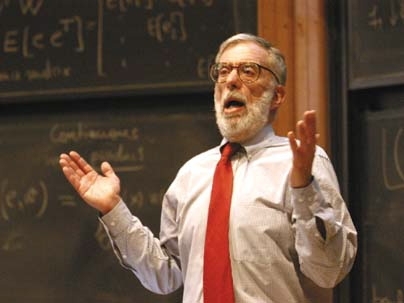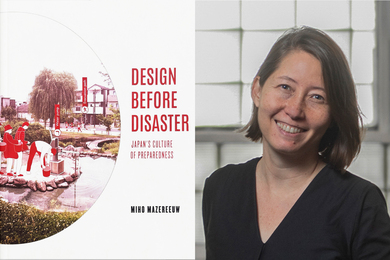Providing students more choice in their undergraduate core requirements may be the key to expanding the scope of a four-year MIT education, according to a report from the Task Force on the Undergraduate Educational Commons made during MacVicar Day on Friday, March 4.
MacVicar Day celebrates the achievements of Professor Margaret MacVicar, the first dean for undergraduate education, who died in 1991.
Each year, faculty and students gather to explore issues in undergraduate education at MIT and celebrate the faculty members named as MacVicar Fellows. This year's MacVicar fellows are Professors Haynes Miller of mathematics, Ruth Perry of literature and David Pesetsky of linguistics.
"I am sure Margaret would be interested and excited about what is going on at MIT right now," said current Dean for Undergraduate Education Robert Redwine.
Room 6-120 was filled to capacity with faculty, students and staff eager to explore the question "What Should We Achieve in a Four-Year MIT Education?"
A little more than a year ago, the Task Force on the Undergraduate Educational Commons began a review of the General Institute Requirements (GIRs) and other aspects of the common undergraduate experience with a view to recommending changes to better serve MIT students.
Currently all undergraduates are required to take six science core subjects -- two each in physics and calculus, one in chemistry and one in modern molecular biology. Students are also required to satisfy a laboratory requirement, take two additional subjects in science, mathematics or technology, and take at least eight subjects in the humanities, arts and social sciences (HASS). In addition, a four-subject communication requirement is satisfied through specific subjects in HASS and in the major. "This is a rigorous undergraduate education," said the task force chair, Dean of the School of Science Robert Silbey.
During the course of its early deliberations, the task force identified a number of working principles about MIT's educational philosophy in order to frame its review. The first principle, Silbey said, was that an MIT education should foster "a persistent passion for learning." He said the task force addressed a lengthy list of subject areas suggested by members of the community for inclusion in the commons experience.
"It is impossible to get everything we want to give to our students in four years," said Silbey. "More things are essential to an MIT undergraduate education, but we are uneasy about adding more requirements. This is our design challenge."
Silbey said he wanted to use MacVicar Day to highlight emerging recommendations and to hear audience reactions. Other task force members on hand were Professors Dava Newman of aeronautics and astronautics, Heidi Nepf of civil and environmental Engineering and chair of the subcommittee on balancing majors and the GIRs, and Charles Stewart, head of political science and chair of the subcommittee on the HASS experience.
Silbey said that the subcommittee examining the core requirements in science and engineering have recommended that the current Institute Laboratory Requirement be replaced with a project-based experience. The subcommittee also provided a number of possible models that would expand the educational scope of the core science and engineering requirements.
One plan would offer more choices to undergraduates than are currently available, but many in the audience were concerned that the option to choose might encourage students to pass over subjects they are not interested in, thereby losing something fundamental to an MIT education. "We do have to prioritize," said Silbey.
Professor Charles Stewart talked about his subcommittee's ideas for changes to the HASS requirement.
Part of the problem with the current requirement, Stewart said, is that students often do not take HASS courses as seriously as their courses in science and engineering. To some extent, Stewart suggested, this might be due to the confusing nature of the requirement. The current requirement is succeeding "retail, but not wholesale," he said. "The complexity really undermines it."
Currently, freshmen choose from among 75 HASS-Distribution subjects. One idea explored by Stewart's subcommittee is to create a "faceted" first-year common experience, allowing students to select from one of five themes - for instance, creativity or democracy. Over the course of the semester, students would explore that topic from a variety of disciplines within HASS with a group of up to 200 other freshmen in small classes studying common material.
Stewart also discussed another model in which students would select one discipline-oriented subject within the same theme as an option in their second year. For all other semesters, students would choose six or seven additional subjects, with a concentration.
By introducing students to the humanities, arts and social sciences in a unified way, the subcommittee hopes to inspire students to continue discussions with their peers outside the classroom.
"We are distinct in requiring more than a science core," said Stewart, adding that the requirement attracts students to MIT who have a broader set of interests. "[MIT students] lead. They don't just sit in a cubicle for the rest of their lives."
Student members of the task force and the Student Advisory Committee will submit their report and recommendations to the task force in the next few weeks, Silbey said.
More information is available at the task force website: http://web.mit.edu/committees/edcommons.
A version of this article appeared in MIT Tech Talk on March 9, 2005 (download PDF).






